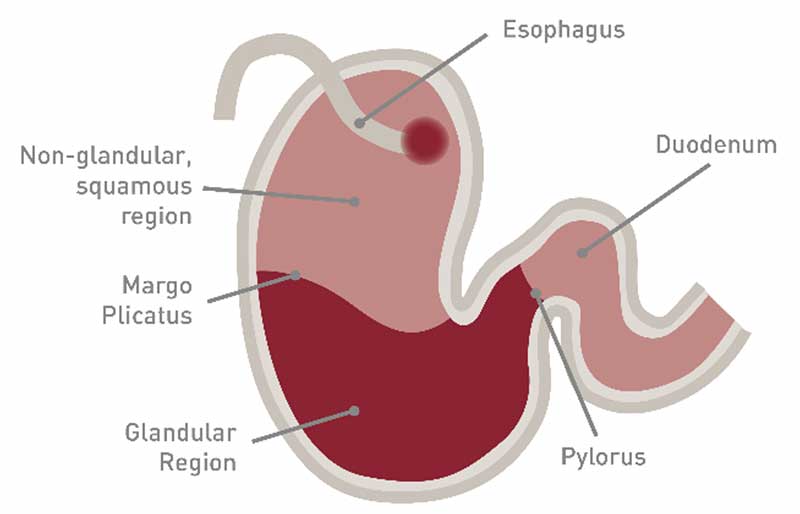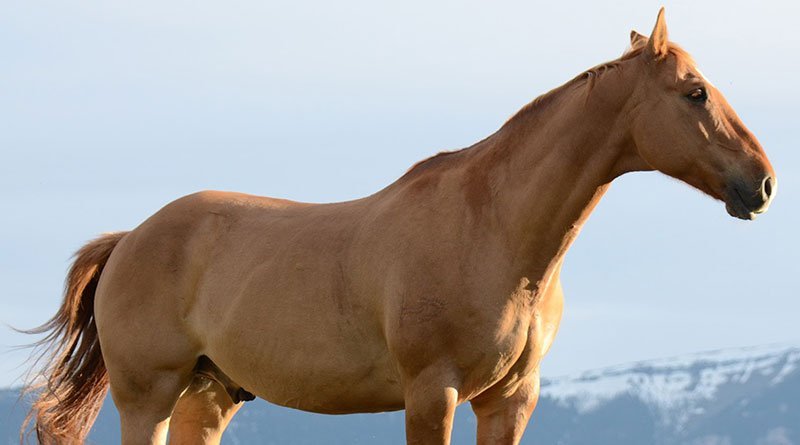Horse Health
Understanding Horse Ulcers: Causes, Symptoms, and Treatment
Learn the real facts on horse ulcers and why they happen
Do you have any supplements for horse ulcers? We are asked this question on a daily basis.
The fact is we have a systemic problem with gastric ulcers in horses. An estimated 65 – 70% of performance horses and over 90% of race horses are affected by ulcers.
This is exactly why you need to read this blog. You need to know what we know about horse ulcers.
Horse Ulcer Myths Debunked
Myth #1: digestion supplements do not fix ulcers.
Even though there are companies who claim this to be a fact, it is simply not true.
There is a long list of horse digestion supplements with ingredients such as slippery elm, licorice, marshmallow root, gamma oryzanol, aloe vera, aluminum phosphate, and more.
These ingredients are used in an attempt to help your horse recover from ulcer treatments or to potentially reduce the risk of ulcers occurring in the first place.
However, these digestive supplements do not prevent or cure gastric ulcers.
Myth #2: feeding your horse GastrogardTM or UlcerGardTM does not prevent ulcers from developing.
These two products are drugs specifically designed to treat gastric ulcers and are the only research-backed products shown to effectively treat ulcers.
Unfortunately, there is a tendency for riders and horse owners to use these two products on a preventive basis.
At Grand Meadows, we strongly urge against this practice. Prolonged usage of drugs like these can play havoc with your horse’s microbiome, impacting your horse’s immune system health, energy metabolism, and fiber digestion.
Plain and simple, if a gastric endoscopy has not definitively shown your horse has a gastric ulcer – you need to stop using these products. And yes, a gastric endoscopy is the only way to prove your horse does in fact have an ulcer.
Okay, now that we have debunked these two horse ulcer myths, let’s focus on the facts about horse ulcers – so you can do your best to keep your horse feeling their best and prevent ulcers from occurring in the first place.
What is Equine Gastric Ulcer Syndrome (EGUS)?
Equine gastric ulcer syndrome (EGUS) is an umbrella term used to describe erosions, ulcerations, and lesions in the terminal esophagus, nonglandular squamous, and glandular regions of the stomach, and proximal duodenum. Performance horses and foals are at greatest risk to develop EGUS. Clinical signs are vague, and treatment requires pharmaceutical agents that increase gastric pH and foster an environment conducive to ulcer healing.
(Source Merck Manual Veterinary Manual)
We like this definition of EGUS because it highlights some key points:
- Performance horses are at increased risk of developing gastric ulcers
- Diagnosis can be challenging
- The horse’s environment is essential to recovery from and prevention of gastric ulcers
What Causes Horse Ulcers?
Equine ulcers are caused by a combination of modern feeding and lifestyle practices:
Twice daily feeding or limited feeding approaches
Horses evolved to graze for a significant portion of the day. Over a 24-hour time period the glandular or lower portion of the horse’s stomach secretes hydrochloric acid that mixes with feed, helping to break it down before it enters the small intestine.
When a horse is able to eat slowly and throughout the day, the stomach works as designed, buffering and protecting the stomach lining from acid.
However, modern feeding practices mean horses are left with empty stomachs, exposed to naturally occurring gastric acid. With nothing to protect against or buffer against this acid, ulcerations may easily develop.

Stall confinement
Horses are designed to need both consistent exercise and grazing opportunities.
When horses are confined to stalls, a collision of factors occur, including an empty stomach, elevated acid levels, isolation, stress due to limited exercise, and a tendency to feed too much grain – this creates the ideal scenario for equine gastric ulcers.
Elevated levels of stress
Performance horses are subjected to excessive levels of transport, exercise demands, performance expectations, and stall confinement. Additionally, horses are sociable animals and depend on herd time spent grazing, running, and playing with their friends to relax and enjoy life.
Trailering, stall confinement, limited time with horse friends, changes in routine, and performance expectations all contribute to elevated levels of stress. The reality is – stressed horses are more prone to developing gastric ulcers.
Overuse of NSAIDs
The prevalence of prolonged or excessive use of NSAIDs in horses is shown to contribute to gastric ulcers, right dorsal colitis, and renal papillary necrosis.
Research shows that NSAIDs can disrupt the gut microbiome, with trickle-over impacts to immune system health, fiber digestion, and further complications. Foals are particularly at risk of equine ulcers when given NSAIDs.
Always discuss NSAIDs with your veterinarian.
Change
Horses do not like change. Changes to routine such as a new stable, travel, new people, changes in training intensity, new herd members or loss of a herd member, changes in feed and grazing patterns, and more may seem small to us – but for your horse, these are big changes.
For your horse, change equals stress, and stress can result in increases in stomach acid production – resulting in greater risk of ulceration.
What are the Signs and Symptoms of Gastric Ulcers in Horses?
The signs and symptoms of gastric ulcers can be subtle, making it easy to miss the signals your horse is giving you when they are unwell.
Be aware of these signs and symptoms of gastric ulcers in horses:
- Changes in appetite
- Behavioral changes
- Lack of interest in training, exercising, or playing
- Changes in coat or skin condition
- Weight loss
- Muscle loss and other signs of changes in body condition
- Digestive problems including chronic diarrhea or recurrent colic
- Girthiness
- Teeth grinding
- Ignoring food and walking away from it
- Laying down more than usual
- Excessive drooling or saliva
- Changes in performance
In foals, signs of gastric ulcers can include diarrhea, pot-bellied body shape, changes in nursing, recumbency, intermittent colic, teeth grinding, or increased drooling and salivation. If your foal shows these signs, contact your veterinarian immediately.
If you notice any changes at all in your horse – contact your veterinarian. Remember, your horse uses their behavior and body condition to communicate with you – telling you when they are both unwell and happy. Do not ignore changes, regardless of how subtle they appear to be.
How are Gastric Ulcers Diagnosed in Horses?
The only way to definitively diagnose gastric ulcers is with a gastroscopy or gastric endoscopy.
How to Treat Ulcers in Horses
Gastrogard and UlcerGard are the only treatments for equine ulcers approved by the FDA.
Along with administration of these prescriptions under supervision of your veterinarian, your horse’s recovery can be supported with:
- A reduction in training intensity
- Increased pasture turnout
- A cautious return to intense training levels
- Ensure your horse’s stress level is reduced
- Reducing the amount of grain in your horses diet
Typically, Gastrogard or UlcerGard are prescribed for four weeks. However, do not assume after four weeks your horse has recovered and is healed. A gastroscopy should be done for a clear picture of your horse’s health and recovery status.
How to Prevent Ulcers in Your Horse
While there is no sure fire way to prevent ulcers in your horse, the following horse care practices may help reduce risk factors and support your horse’s overall health and happiness:
- Reduce the amount of grain you feed your horse and focus on feeding your horse high quality forage free from pesticides, chemicals, and irritants.
- Limit travel, intense training, trailering, stall time, and isolation.
- Give your horse ample herd and grazing time.
- Feed your horse smaller and more frequent meals.
- Make it easy for your horse to see, interact, and communicate with other horses.
Admittedly, it can be challenging in urban environments to give your horse the freedom and socialization they need to graze freely and interact with other horses. In these situations, it’s important to limit other risk factors such as reducing the amount of grain, making it easy for your horse to eat throughout the day, limiting travel and training intensity, and reducing stress overall.
Final Words on Gastric Ulcers and Your Horse
Unfortunately, there isn’t a magic bullet for the epidemic of gastric ulcers in horses.
Sadly modern day challenges including limited grazing land for horses, the punishing training and showing regimen for performance horses, and the overfeeding of grain, make it is hard to see the epidemic of gastric ulcers abating anytime soon.
While horse digestion supplements may help in reducing potential problems, risk factors will always be present for most horses.
As a horse person, the onus is on you to be aware of the risk factors, to pay attention to all the signals your horse is giving you, and to always contact your veterinarian should there be any changes to your horse’s behavior or condition.

